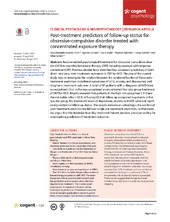Post-treatment predictors of follow-up status for obsessive-compulsive disorder treated with concentrated exposure therapy
Holm, Silje Elisabeth Hasmo; Hansen, Bjarne; Kvale, Gerd; Eilertsen, Thomas; Grøtte, Torun; Solem, Stian
Peer reviewed, Journal article
Published version

Åpne
Permanent lenke
https://hdl.handle.net/1956/19238Utgivelsesdato
2018-04-09Metadata
Vis full innførselSamlinger
- Faculty of Medicine [31]
Sammendrag
Recommended psychological treatment for obsessive-compulsive disorder (OCD) is cognitive behavioral therapy (CBT) including exposure with response prevention (ERP). Previous studies have identified few consistent predictors of both short- and long-term treatment outcomes in CBT for OCD. The aim of the current study was to investigate the relation between the combined burden of three post-treatment predictors (subclinical symptoms of OCD, anxiety, and depression) and long-term treatment outcome. A total of 97 patients with a diagnosis of OCD from an outpatient clinic in Norway completed a concentrated four-day group treatment of ERP for OCD. Results revealed that patients in the high-risk group had 2.5 times the risk (odds ratio = 10.1) of having OCD at follow-up compared to patients in the low risk group. Pre-treatment levels of depression, anxiety and OCD were not significantly related to follow-up status. The results indicate an advantage of a combined post-treatment predictor model over single pre-treatment predictors. Furthermore, we argue that the intensive four-day treatment format provides a unique setting for investigating predictors of treatment outcome.
